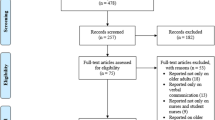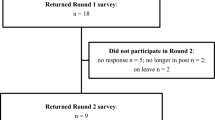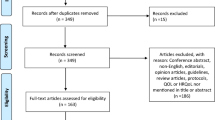Abstract
Background
Commercial conversational agents (CAs) bear the promise of low threshold accessibility for individuals with limited digital competencies. This applies not only for healthy aging older adults but also for specific subgroups such as those with life-long intellectual disabilities (ID).
Objective
This scoping review aims to synthesize the current evidence on benefits and challenges of CAs for older adults with and without ID. In doing so, we hope to inform future research as well as practical decision-making in the context of CAs as potential quality of life enhancers for older adults with various competence levels.
Material and methods
A literature search was conducted in form of a scoping review. A total of 841 publications were screened for benefits and challenges of CAs, resulting in an extraction of 18 articles targeting healthy aging older adults (60 years+) and 5 articles targeting older adults with ID (50 years+) for synthesis.
Results
The existing evidence suggests that CAs come with more benefits than challenges, e.g., general ease of use, easier information access, and feelings of companionship. Higher perceived agency due to using a CA seems to be a specific issue for older adults with ID. Challenges concern mostly learning how to use a CA and privacy concerns.
Conclusion
The results indicate that CAs can serve as quality of life enhancers both in healthy aging adults and in older adults with ID; nevertheless, thoughtful preparation is necessary, especially in relation to learning needs, capabilities present and privacy concerns.
Zusammenfassung
Hintergrund
Kommerzielle konversationelle Agenten (KAs) versprechen eine niedrigschwellige Zugänglichkeit für Personen mit eingeschränkten digitalen Kompetenzen. Dies gilt für gesund alternde ältere Menschen, aber auch für bestimmte Untergruppen wie Ältere mit lebenslanger geistiger Behinderung (gB).
Ziel
Dieses Scoping-Review zielt auf eine Synthese der aktuellen Forschung zu Nutzen und Herausforderungen von KAs für ältere Menschen mit und ohne gB ab. Damit soll eine Grundlage für Forschung und Praxis im Zusammenhang mit KAs als potenziellen Verstärkungsfaktoren für die Lebensqualität älterer Menschen mit verschiedenen Kompetenzniveaus geschaffen werden.
Material und Methode
Die Literaturrecherche wurde in Form eines Scoping-Reviews durchgeführt. Es wurden insgesamt 841 Publikationen gesichtet und 18 Artikel zu gesund alternden älteren Menschen (≥ 60 Jahre) sowie 5 Artikel zu älteren Menschen mit gB (≥ 50 Jahre) in die Synthese eingeschlossen.
Ergebnisse
Die Ergebnisse deuten darauf hin, dass KAs mehr Vorteile als Herausforderungen mit sich bringen, z. B. insgesamt eine einfache Nutzung, ein leichterer Zugang zu Informationen sowie das Gefühl von Gesellschaft. Eine höhere Wahrnehmung von Handlungsmacht aufgrund der KA-Nutzung scheint ein spezielles Ergebnis für ältere Menschen mit gB zu sein. Herausforderungen betreffen das Erlernen der Nutzung eines KA und Bedenken hinsichtlich der Privatsphäre.
Schlussfolgerung
KAs können die Lebensqualität sowohl bei gesund alternden Erwachsenen als auch bei älteren Erwachsenen mit gB verbessern. Dennoch ist eine sorgfältige Vorbereitung erforderlich, insbesondere in Bezug auf die Lernbedarfe, vorhandene Fähigkeiten sowie Bedenken zur Privatsphäre.

Similar content being viewed by others
Notes
“Intellectual disability is a condition characterized by significant limitations in both intellectual functioning and adaptive behavior that originates before the age of 22 years.” [19].
References
Abdolrahmani A, Kuber R, Branham SM (2018) “Siri talks at you”: an empirical investigation of voice-activated personal assistant (VAPA) usage by individuals who are blind. In: Proceedings of the 20th International ACM SIGACCESS Conference on Computers and Accessibility. ACM, Galway, pp 249–258
Arnold A, Kolody S, Comeau A et al (2022) What does the literature say about the use of personal voice assistants in older adults? A scoping review. Disabil Rehabil Assist Technol. https://doi.org/10.1080/17483107.2022.2065369
BAGSO (2022) Web site. https://www.bagso.de/. Accessed 16 June 2022
Barnard Y, Bradley MD, Hodgson F, Lloyd AD (2013) Learning to use new technologies by older adults: perceived difficulties, experimentation behaviour and usability. Comput Human Behav 29(4):1715–1724
Checkmyva (2022) Project. https://checkmyva.de/language/en/project/. Accessed 6 Apr 2022
Couper-Kuhlen E, Selting M (2017) Interactional linguistics: studying language in social interaction. Cambridge University Press, Cambridge
Digitaler-Engel (2022) Web site. https://www.digitaler-engel.org/. Accessed 16 June 2022
Ehlers A, Hess M, Frewer-Graumann S et al (2020) Digitale Teilhabe und (digitale) Exklusion im Alter. In: Hagen C, Endter C, Berner F (eds) Expertisen zum Achten Altersbericht der Bundesregierung. Deutsches Zentrum für Altersfragen, Berlin, pp 1–39
Jakob D (2022) Voice controlled devices and older adults—a systematic literature review. In: Gao Q, Zhou J (eds) Human aspects of IT for the aged population. Design, interaction and technology acceptance. HCII 2022. Lecture notes in computer science, vol 13330. Springer, Cham, pp 175–200
Leung R, Tang C, Haddad S, McGrenere J, Graf P, Ingriany V (2012) How older adults learn to use mobile devices. ACM Trans Access Comput 4(3):1–33
McTear M, Callejas Z, Griol D (2016) The conversational interface: talking to smart devices. Springer, Cham
Medienpädagogischer Forschungsverbund Südwest (2021) SIM-Studie 2021. Senior*innen, Information, Medien
Neves BB, Franz RL, Munteanu C et al (2015) “My hand Doesn’t listen to me!”: adoption and evaluation of a communication technology for the ‘oldest old’. In: Proceedings of the 33rd Annual ACM Conference on Human Factors in Computing Systems. ACM, Seoul, pp 1593–1602
Peters MD, Godfrey CM, Khalil H et al (2015) Guidance for conducting systematic scoping reviews. Int J Evid Based Healthc 13:141–146
Pew Research Center (2021) 7% of Americans don’t use the internet. Who are they? https://www.pewresearch.org/fact-tank/2021/04/02/7-of-americans-dont-use-the-internet-who-are-they/. Accessed 16 June 2022
Pradhan A, Mehta K, Findlater L (2018) “Accessibility came by accident”: use of voice-controlled intelligent personal assistants by people with disabilities. In: Proceedings of the 2018 CHI Conference on Human Factors in Computing Systems—CHI ’18, pp 1–13
Ramadan Z, Farah M, El Essrawi L (2020) From Amazon.com to Amazon.love: how Alexa is redefining companionship and interdependence for people with special needs. Psychol Mark 38(4):1–14
Ruff C, Horch A, Benthien B, Loh W, Orloswki A (2021) DAMA—A transparent meta-assistant for data self-determination in smart environments. In: Open identity summit. Lecture notes in informatics, pp 119–130
Schalock RL, Luckasson R, Tassé MJ (2021) An overview of intellectual disability: definition, diagnosis, classification, and systems of supports (12th ed.). Am J Intellect Dev Disabil 126:439–442
Schlomann A, Even C, Hammann T (2022) How older adults learn ICT—guided and self-regulated learning in individuals with and without disabilities. Front Comput Sci 3:803740
Schlomann A, Rietz C, Zentel P, Heyl V, Wahl H‑W (2021) KI-basierte Sprachassistenz im Licht der Heterogenität von Altern: Das Beispiel geistige Behinderung. Bild Erziehung 74:296–312
Schlomann A, Wahl H‑W, Zentel P, Heyl V, Knapp L, Opfermann C, Krämer T, Rietz C (2021) Potential and pitfalls of digital voice assistants in older adults with and without intellectual disabilities: relevance of participatory design elements and ecologically valid field studies. Front Psychol 12:684012
Smith E, Sumner P, Hedge C, Powel G (2020) Smart-speaker technology and intellectual disabilities: agency and wellbeing. Disabil Rehabil Assist Technol. https://doi.org/10.1080/17483107.2020.1864670
Statista (2022) Absatz von intelligenten Lautsprechern weltweit vom 3. Quartal 2016 bis zum 1. Quartal 2022. https://de.statista.com/statistik/daten/studie/818982/umfrage/absatz-von-intelligenten-lautsprechern-weltweit-pro-quartal/. Accessed 16 Feb 2022
Stigall B, Waycott J, Baker S et al (2019) Older adults’ perception and use of voice user interfaces. In: Proceedings of the 31st Australian Conference on Human-Computer-Interaction. ACM, Fremantle, pp 423–427
WHO (2022) UN decade of healthy ageing. https://www.who.int/initiatives/decade-of-healthy-ageing. Accessed 13 June 2022
Funding
This publication is part of the AI-Aging project (AI-based voice assistants for older adults with and without intellectual disabilities), which is funded by the Baden-Württemberg Stiftung within the funding line Responsible Artificial Intelligence.
Author information
Authors and Affiliations
Corresponding author
Ethics declarations
Conflict of interest
C. Even, T. Hammann, V. Heyl, C. Rietz, H.-W. Wahl, P. Zentel and A. Schlomann declare that they have no competing interests.
For this article no studies with human participants or animals were performed by any of the authors. All studies mentioned were in accordance with the ethical standards indicated in each case.
Additional information

Scan QR code & read article online
Supplementary Information
391_2022_2085_MOESM1_ESM.docx
Appendices 1–8 containing search string, full list of selection criteria, final publication corpus, overview of study characteristics and overviews of benefits and challenges with publication identifiers in relation to target groups and market readiness and duration of usage
Rights and permissions
About this article
Cite this article
Even, C., Hammann, T., Heyl, V. et al. Benefits and challenges of conversational agents in older adults. Z Gerontol Geriat 55, 381–387 (2022). https://doi.org/10.1007/s00391-022-02085-9
Accepted:
Published:
Issue Date:
DOI: https://doi.org/10.1007/s00391-022-02085-9




